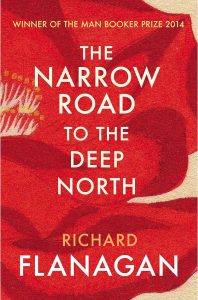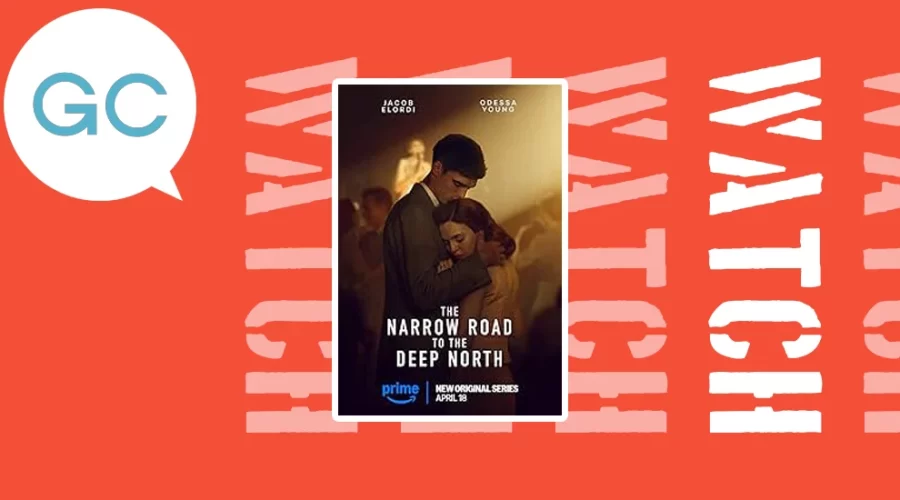“But this is for the Emperor.
It must be done.”
As far as WWII horrors go, we don’t hear often enough about what Imperial Japan inflicted on Australian POWs.
 Richard Flanagan’s novel, The Narrow Road to the Deep North, brought this tragedy to life for a new generation a little over a decade ago – and subsequently won the 2014 Booker Prize.
Richard Flanagan’s novel, The Narrow Road to the Deep North, brought this tragedy to life for a new generation a little over a decade ago – and subsequently won the 2014 Booker Prize.
This year, we finally got an eponymous miniseries, currently available on Prime.
Before I say anything else, I have to point out that I loved Flanagan’s book, although some respected critics dismissed it as overwritten and badly in need of a ruthless editor.
As much as I, in turn, respect ruthless editors, I sunk into The Narrow Road to the Deep North like a dream. Flanagan’s descriptions have been etched onto my conscience. A chapter featuring an out-of-control wildfire in peacetime Australia still stays with me, as do the magic words about a dead woman’s necklace, glittering within the deep sleep of the earth.
I believe that it’s the fate of many great books to be overwritten, and I don’t begrudge Flanagan the churning depth and scope of his prose.
Shaun Grant’s mini-series adaptation is similarly in love with this prose, and for that, I am grateful.
What I absolutely cannot get over is the cinematography. Directors are overfond of darkness these days – while I frequently bitch about that, it’s rare that darkness and muted tones actually begin to spoil the experience for me, but this adaptation simply goes all out.
Even the famous red flower worn by Amy, one of the two love interests of the hero, Dorrigo, is washed out to a weird, dull brown. Even most of the time Dorrigo spends with Amy on the beach reminds me of being stuck in a cold, poorly lit room, though the beach scenes do come alive by the end.
I understand the point the filmmakers were trying to go for with this palette, but the intent just doesn’t quite come through.
If you’ve read Flanagan’s very vivid book, you might find the mini-series barely watchable at times.
It’s not that I want a narrative of brutal, cascading tragedies set during one of the worst chapters of human history to look like a Disney movie – it’s that I can barely tell what’s going on half the time when watching this adaptation.
Adjusting the TV settings only does so much. Watching in the dark only does so much.
There’s also been a curious casting choice, as both the actresses playing Amy, arguably the love of Dorrigo’s life (even though she also happens to be his uncle’s second wife), and Ella, whom Dorrigo actually marries, look weirdly alike. While I understand the departure from the book, and think it’s an intriguing choice, what is Dorrigo really looking for?
Clearly, he has a type, the director implies, but the confusing cinematography just makes this particular decision annoying.
The decision to skip around in time, as Flanagan does, is well-executed, and the music is top notch. Jacob Elordy is wonderfully cast as the young Dorrigo (Ciarán Hinds is equally great as the older version). Clearly, a lot of love and care went into parts of this adaptation, which makes the parts that do not work all the more disappointing.
It’s not that it’s messy – I’ll always have a soft spot for messy television – it’s that it’s so weighed down by its own sense of importance that the story never quite pulls you in.
Flanagan spent a great deal of time accessing the horror inflicted on POWs by Japan via his characters. In his telling, the “glorious” goal of building the Burma Railway outweighed all of the human considerations involved, and this telling is supported by history.
There is a terrible intimacy to the way Flanagan chose to treat the failed project that cost so many lives and today, when I look at Russia’s war on Ukraine, I hear echoes of it in the screams of every dying soldier and civilian.
The miniseries cracks this timeless horror open when it portrays a completely mindless, lengthy execution of a beloved character, and the forced apathy of the survivors. Without giving too much away, this is the part of the adaptation that truly gels, albeit in a way that is bound to give you nightmares (and for good reason).
The masters of violent death always work to make some of their victims complicit, and Shaun Grant’s writing and Justin Kurzel’s direction drive this point home. Overwhelmingly.
A selection process for a grueling death march, which follows the execution, is given similarly stellar treatment. The jaws of imperial bureaucracy are gleaming with all of their stupid might.
Yes, the men will die. Yes, it will be pointless. But it is for the Emperor.
Television has its own constraints, and I didn’t need a retelling that copied the book in every way (I’ve argued as much when it comes to superfans of Tolkien who’ve been yelling about Peter Jackson’s original Lord of the Rings for decades).
Still, it would have been good to have included more of the meat of the story, considering how well Flanagan treated the elusive nature of justice and fairness and reconciliation with the past, and six episodes isn’t enough.
As such, what we have left is a good adaptation of a great book. It’s not enough, but it may have to do.

